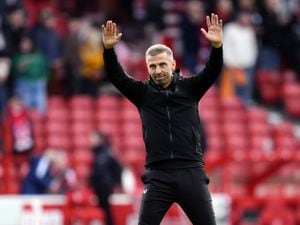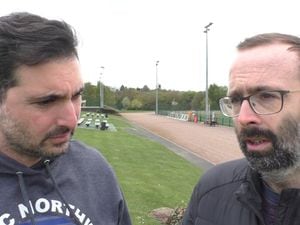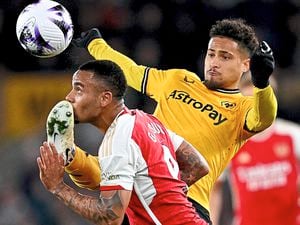Wolves throwback: John Pender tackles toughest foe
John Pender really isn’t having it.
“I was never a good player, I wouldn’t class myself as a good player.”
“But you made over 600 appearances, John? Many in the top flight, captained Wolves at just 19 and won a load of promotions? You must have done something right?”
“Nah, I was a nasty player, not a good player. I had a lot of bad games.
“I was good at stopping the opposition though, I was good at tackling people, I know that much!”
We are sat in the Penders’ living room in Muxton near Telford, with John and his wife Denise, discussing his career.
Richard Green, the Administration Manager of Wolves Former Players’ Association, is also in attendance, whilst Pender’s close friend of over 20 years Carl Appleby, has just left after delivering a verbal hurricane of choice banter in his mate’s direction.
Sadly we are not here just to look back on what was a hugely impressive footballing career, despite Pender’s protestations to the contrary.
We are also here because the family have decided to go public on the diagnosis received 18 months ago that he is suffering from a form of Motor Neurone Disease.
They took that difficult decision partly to raise awareness not just of Pender’s diagnosis but Motor Neurone Disease as a whole, but also through a need to raise funds for equipment including a new wheelchair to ensure they will still be able to enjoy trips and the great outdoors, trying to maintain a quality of life for as long as possible as his condition progresses.
There are already signs of the many alterations which are necessary as the family wrestle with the challenges and changes required to ensure John can continue to live and be cared for at home.
It is a horrible disease and a horrible situation, but Pender is aiming to stay positive, amid that self-effacing sense of modesty which family and former team-mates say has remained with him throughout.
We try again: “They call you Captain Fantastic at Burnley don’t they?”
A moment of silence is followed by a broad smile. If there is one tiny consolation at present it is that Pender’s memory of football and those he played against and alongside is still as sharp as a tack. The names come thick and fast as he relives a near 20-year career.
His memory is strong but sadly, as a result of one of the many cruel symptoms of Motor Neurone Disease, his mobility is not.
Pender can sit upright in a chair but is unable to move himself and is reliant both on the help and support of Denise – who gave up her job in February to effectively become his full-time carer – and a wheelchair, to be able to get around.
At present, the wheelchair isn’t overly comfortable – “I’m a big fella,” he points out - and means trips out have to be limited to around an hour. A more custom-built specialised chair bringing more comfort and therefore more flexibility costs in the region of £8,000 to £9,000.
At this stage it is worth remembering that Pender played football at a time when salaries were more in line with what you might call a ‘normal’ wage, and he took on hard graft in three different jobs after hanging up his boots while Denise had always worked up until February of this year.
They have received financial support from the PFA, and there may be the chance to apply for more, but with so much expense invested into adapting the house to meet Pender’s needs, the fundraising campaign has grown in importance, particularly for the wheelchair.
“There is equipment you can get to make things that little bit easier and getting a more custom-built wheelchair will make such a difference and would mean we could go out for the day which is so important,” says Denise.
“Anything on top of that and we would also be able to have a chair for indoors, and moving forward we know we are going to need support with caring for John as well.”
The support received from the fundraising page set up in pursuit of those ambitions has been both swift and heartfelt, passing through £13,000 by the start of this week.
But that level of backing should come as no surprise towards a player who always wore his heart on his sleeve, from the moment he made his Wolves debut as an 18-year-old up against Bob Latchford and Swansea in March, 1982.
Born in Luton, the Pender family moved to Birmingham when he was young, and then to Lichfield, where he and Denise first met at school when they were 15.
Footballing-wise he spent several years as a schoolboy with Aston Villa before Wolves made their move, spotting him as a centre forward playing for Lichfield Social.
“They came to watch me in a game at Beacon Park, and I have a feeling I got sent off,” Pender recalls with a laugh.
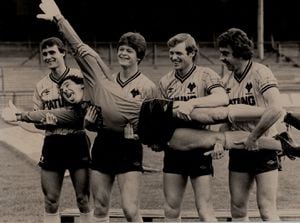
It didn’t put them off, and Pender was snapped up as an apprentice working under youth team coaches John Jarman and Ian Ross, by now converted to a central defender.
“I was probably about tenth choice centre back at the start but gradually I moved up the pecking order until I got in the first team,” he reports.
There was plenty of experience for Pender to lean on as he made his introduction into a team that was occupying the top flight albeit heading for relegation.
He cleaned Emlyn Hughes’ boots, remembers the likes of George Berry, Andy Gray and John Richards – “who was Wolves through and through” – and would later form an excellent central defensive partnership with Alan Dodd.
Pender’s leadership skills ensured he would also captain Wolves whilst still in his teenage years, even if he needed some gentle persuading to enjoy some of the trappings associated with breaking through from a youth system including Dale Rudge, Ian Cartwright, Paul Butler and Billy Livingstone.
“I wouldn’t say I really wanted to be captain, and I didn’t even want to be in the first team dressing room – all my mates were in the other dressing room,” Pender explains.
“I wanted to stay where I was, but obviously things change, and the experienced players, legends some of them, all looked after me.
“I suppose I was fairly quiet off the pitch but I was vocal when I got on it, the adrenaline took over and I shouted a lot!
“You can see everything in front of you as a central defender, so I suppose that also helped with being captain.”
Pender’s no-nonsense physical approach, which has perhaps lent itself to his way-too-modest claims about not being a good player, was very much a good fit for the era.
He was only sent off twice in his career, but admits that in the current climate, he would rarely have lasted 90 minutes!
“There is more football played now but back in those days it was more physical and the referees would always allow you one or two ‘nice’ tackles before you got in any trouble,” says Pender, who counts Mick Harford as his toughest ever opponent.
“I used to go in on someone early and if they didn’t react I knew I had them – if they did respond and kick off then I realised it was going to be a tough afternoon!
“I wouldn’t have lasted long on the pitch these days – I’d have been sent off left, right and centre!”
There was far more to Pender’s game than just brute force and, as if to prove it, Denise digs out ‘Exhibit A’ which she had found whilst rummaging through old photographs.
It’s a photo of Pender, fellow centre back Bob Coy and full backs John Humphrey and Geoff Palmer holding up keeper John Burridge – “a crazy man!” – in a snap taken by the Express and Star.
It was captured to mark the eight successive clean sheets which that back five chalked up towards the start of the promotion-winning 1982/83 season, following on from a Mel Eves brace in an opening day win against Blackburn.
Pender, nicknamed ‘Sus’ in the dressing room at Molineux – not too tricky to work out! - missed only three league games of that successful campaign, and was pretty much a mainstay back in the top flight and again after relegation during the next two.
By this time however, Wolves were nose-diving headlong into the spiral which took them to the lower echelons of the entire Football League and the brink of extinction, and Pender was among those moved on, accompanying Humphrey to Charlton shortly after he and Denise returned from their honeymoon in St Lucia.
It was with the Addicks that Pender enjoyed his second promotion, a move to Bristol City then saw him achieve his third, and rounding off his career with Wigan – after a spell with Rochdale – made it six.
In between times, during five years spent at Wolves’ midweek opponents Burnley, Pender was perhaps in his footballing prime and, as that ‘Captain Fantastic’, enjoyed the most successful phase of his career.
First Burnley won what in modern money would be the League Two title in the 1991/92 season before, two years later, winning the play-off final against Stockport in the division above affording Pender that coveted task of climbing the famous steps of the old Wembley to lift a trophy.
“We had such a good side at Burnley and it all really gelled,” he recalls.
“Playing and winning at Wembley has to be the best game of my career, maybe that and my debut for Wolves.
“At that time with Burnley, I thought we were so good, that even if we went behind I was confident we would come back and win.
“But when Stockport scored after just two or three minutes, I have to say I wasn’t too sure!
“It all worked out in the end though, and we got to lift the trophy.”
Ultimately Pender’s retirement came after he damaged his cruciate knee ligaments and patella tendon whilst at Rochdale.
There was the need to head straight into a new career, and he spent a decade-and-a-half working in management for an insulation company in Worcester before redundancy saw him switch industries to become a delivery driver for ASDA in Telford.
From there he continued driving, this time National Express buses, in Wolverhampton, but was rarely recognised by those fans who had cheered him all those many years earlier. “It had been ages since I had played,” he insists.
While Pender enjoyed all the clubs he represented during his career, it is Wolves – his first – and Burnley, where he tasted so much success, that remain closest to his heart.
Two clubs that share so much, from being founder members of the Football League, to serving as focal points of their communities, to winning all four divisions and boasting the sort of sizeable and passionate fanbases that heralded over 80,000 journeying to Wembley for a Sherpa Van Trophy final in 1988.
And now, a shared desire to help and support the Pender family as much as possible.
Sadly diagnoses such as this are not unfamiliar to Burnley fans, with Lenny Johnrose being diagnosed with Motor Neurone Disease in 2017 and Gary Parkinson, who scored the winner in that 1994 play-off final, suffering from locked-in syndrome following a severe stroke in 2010.
Several events are already planned, with the Pender family encouraging fans to join a fundraising walk up Pendle Hill in January and Burnley’s Former Players Association organising a 30th anniversary dinner of their Fourth Division title success in April.
From a Wolves perspective, the Former Players Association of which Richards is now Chairman have made a £1,000 donation towards the Just Giving fund set up to support Pender, and Wolves as a club have been keen to help and have provided an Executive Box for their former captain and his family to take in Wednesday’s Molineux fixture between two of his former clubs.
He fancies a Wolves win, but will be hoping for a draw!
Looking further ahead it is now about making life as comfortable as possible for Pender, ensuring he is able to enjoy a quality of life and many more celebrations with children and grandchildren as enjoyed for his 58th birthday the weekend before last.
It was in 2019 that Pender first started feeling dizzy and then regularly falling over, prompting the start of a monitoring process which eventually led to the diagnosis.
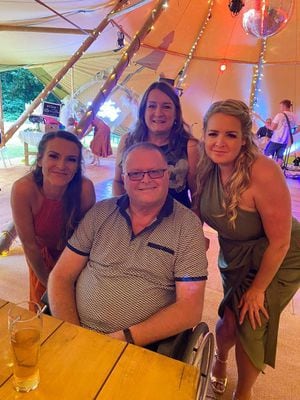
“It is one of those illnesses where it is only the progression of it that tells you what it is,” says Denise.
She admits that amid the aim of staying positive there are, completely understandably, many ‘bad moments’ and ‘moments when they feel down’.
“But we can’t change it so all we can do is make things as comfortable as we can and get out and do things – that’s the main thing,” she adds.
In Denise, Pender clearly has an ally with as much care and courage in looking after him as he displayed on the football pitch.
“It is just one of those things,” he chips in. “No one ever expects something like this to happen, do they?
“I can’t get up and do anything now, Denise has to do everything, but all I can do is try and stay positive, and find my own way – find our own way.”
Part of that, as so often within the football fraternity even in the most difficult of circumstances, is to find humour.
A message from former Burnley team-mate John Deary suggested to Pender that he – Deary – was the only reason that team were successful. Pender loved that.
And his pal Appleby, a fantastic warm-up act for our interview, keeps Pender on his toes.
“There have been tears, of course there have, but we do what we can to keep spirits up,” he says.
“I take the piss out of him and he takes the piss out of me, and that’s how it is.
“John goes on about playing at Wembley and winning the play-offs but I have to remind him that I also played at Wembley the once, in a charity match with Dermot Reeve, Roger Black and Tony Hadley from Spandau Ballet!”
A stellar line-up!
Meanwhile the Pender family, such a close-knit family, have been the rock of support for John and Denise. Strong, steadfast and true.
The couple have four grown-up children – Nikki, Lauren, Danny and Jade – who used to attend all Dad’s home games in a small minibus, and are now rallying around to support him with just as much love and devotion in his next chapter.
There also four grand-children – Connor, Ava, Jacob and Harry – with Connor and Jacob fully-fledged Wolves fans.
“The family have been brilliant and are now helping with everything including raising awareness,” says Denise.
Indeed it is only when asked about the support he has received from all quarters since his diagnosis was made public that Pender becomes visibly emotional.
“I just want to thank everyone,” he says, after a pause.
“Please just thank everyone for what they are doing.”
For the Pender children, of course life has changed dramatically, but they too are keen to remain positive.
Lauren shares the words of all four, revealing: “Our Dad’s diagnosis, has been devastating for the whole family.
“Dad was always the first one up walking the dogs in the morning and the life and soul of our family gatherings.
“MND is such a debilitating disease that even a simple task such as considering a restaurant needs more planning and thought.
“But Dad’s spirits remain high and our mum Denise is a super hero who devotes her whole life to making sure Dad gets everything he needs.
“As a family it has brought us closer and causes us to truly enjoy our time together - making the best memories.
“Receiving the support from all the football fans, ex colleagues, friends and family has been amazing - reading them make us smile, laugh and cry!
“We fondly recall attending Dad’s matches to watch him play and hearing the fans chanting, which are, and will remain, very special memories for us.
“We thank each and every person for their generous and kind donations.”
As the family combine the need to support Mum and Dad emotionally with also channelling vital fundraising, there is a sense that scrutiny around Motor Neurone Disease, and a groundswell for greater funding and more research, is most definitely on the increase.
There have been several high-profile cases among sportsmen in recent years – rugby players Doddie Weir and Rob Burrow – and footballer Stephen Darby, that have undoubtedly moved the condition more into public consciousness.
Only last week it was announced that the government are investing £50million of funding over five years into setting up an MND Research Institute to co-ordinate efforts to find effective treatments for the disease.
And Burrow’s former Leeds team-mate Kevin Sinfield completed the latest of his own extraordinary challenges by running 101 miles and raising over £1million for the MND Association and Leeds Hospitals Charity.
There is also conversation, as with dementia, about whether the condition is related to head injuries sustained during their respective careers, a discussion which will certainly continue alongside that of providing care and adequate funding for those diagnosed.
That support from the footballing fraternity will certainly be there for Pender, whose career total of 602 appearances included 129 for Wolves – with four goals – and 220 for Burnley, with 11 goals.
So yes, he was a good player. And more than just a tackler!
Even more so given the fact that, thanks to qualifying via his Irish parents, he was also capped five times for the Republic of Ireland’s Under-21 team, some of which came in the European Youth Championships in Finland in 1982.
It was an impressive career.
And so, Pender has been a footballer, an insulation manager, a delivery driver and a coach driver.
Faced with such a cruel and far-reaching diagnosis, now is his time to enjoy life as much as possible as a husband, a dad, a grandad, a brother and a friend.
The depth of admiration within the football community for Pender both as a player and as a person means the family are certainly not going to be alone in what lies ahead.
Whether it’s Wolves, Burnley, Charlton, Bristol City, Wigan or Rochdale, or the football fraternity as a whole, people will want to show their support.
John Pender was a centre back who was central to many footballing successes but never craved being the centre of attention.
He is now at the centre of many people’s hearts and minds. And everyone wishes him well.
If you wish to donate to the Just Giving fund to support John, the link is here - https://www.justgiving.com/crowdfunding/n-pender

